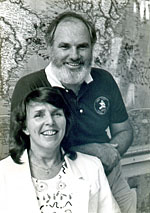 |
The Oceania Project's |
 |
The Oceania Project's |
Join the Expedition | Research | Internship | Study Area | About Us| Dedication | Inspiration | Affiliations | Technology | History | |
Understanding the role of the sailing ship |
|
In 1983 Trish and Wally were invited by Jane and Jonathan King to be the Project Managers of a Bicentennial Project: The Re-enactment of the Voyage of the First Fleet. At that time Trish was completing her studies at La Trobe University on early interactions between Aborigines and Europeans in the Victorian Wimmera and had been accepted into a Masters Honors Program at the University of Sydney to pursue her study of early Aboriginal/European history and interactions. Acceptance of the First Fleet Re-enactment challenge mean't she would have to set aside her interest in history as well as her developing interest in Cetacea. More importantly she understood the role of the First Fleet Re-enactment as an instrument of European invasion which led to the near genocide of the original Aboriginal occupants of Australia. The Federal Government was against the First Fleet Re-enactment project and Trish realised that if it did not go ahead the true story of what had happened to the Aboriginal people may be swept under the carpet. Consequently she persuaded Wally that they should accept the challenge and trust that the First Fleet Re-enactment would provide a platform for the Aborginal Community to tell their side of the story. The successful arrival of the First Fleet Re-enactment ships in Sydney Harbour on the morning of Australia Day 1988, witnessed by 2.3 million Australians, with millions more watching on TV, did provide that platform for Australia's Aboriginal Community as they displayed the 'We Have Survived' banner from the cliffs of Sydney Harbour as the First Fleet Re-enactment entered the heads. Ironically at the Australia Day Awards in January 1989 Prime Minister Hawke awarded 'The First Fleet Re-enactment Voyage' joint event of the Bicentennial year along with the World Expo staged in Brisbane. Trish had maintained historical records of the 5 year process of the First Fleet Re-enactment which affirmed its value as a catalyst for debate of 'Aborginal Issues' in Australian and World-Wide media. Those records were sought by, and subsequently donated to, the archives of the Mitchell Library in NSW. The story of the The Re-enactment of the Voyage of the First Fleet has ben told in several books by Dr Jonathan King and in a televison documentary Rite of passage
Trish and Wally's involvement in the First Fleet Re-enactment , between 1983 and 1988, led them to a deeper understanding of the role of the sailing ship in the history of commercial whaling and the role of ship technology in the near Genocide of the Cetacean Nation. |
 Trish and Wally - First Fleet Office in July 1988. After completion of the First Fleet Project in September 1988 they embarked on a 3 month round world journey to learn about whales and to meet key people involved with various aspects of human/whale interactions past & present. At a small museum in Provincetown, at the tip of Cape Cod, Trish found journal entries written by Pilgrims telling how they had selected an Arctic Whaling Captain and crew to sail the Mayflower safely across the Atlantic. They arrived off Cape Cod in November 1620 during the Humpback whale feeding season off the Massachusett coast. Thus began the US whaling industry. On return to Byron Bay in early 1989 Trish began work on establishing The Oceania Project. Two ships from the Re-enactment Fleet, Anna Kristina & Svanen, became the Expedition vessel's between 1989 and 1994. |
|
Homepage | SoundNet | Expedition | Youth | Whales | iWhales | Subscribe | Links | Help | Overview About Us | Objectives | Corporate Structure | Terms of Use | Privacy Policy | Contact |